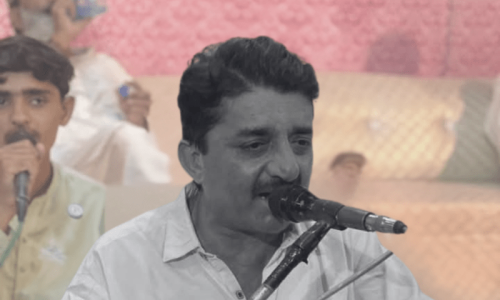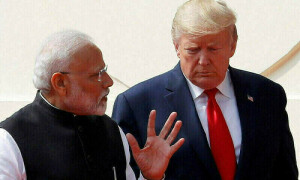BANGKOK: Protesters trying to derail Thailand's national elections forced the closure of hundreds of polling stations in a highly contentious vote that has become the latest flashpoint in the country's deepening political crisis.
Around the country, the vast majority of voting stations were open and polling proceeded relatively peacefully, but the risk of violence remained high a day after gun battles in Bangkok left seven people wounded.
The national focus was riveted to the capital where 488 of the capital's 6,600 polling stations were shut and several skirmishes broke out between protesters intent on disrupting the vote and frustrated would-be voters.
In some cases, protesters formed blockades to prevent voters from entering polling stations.
Elsewhere, protesters blocked the delivery of ballots and other election materials, preventing voting stations from opening.
The Election Commission said that hundreds of polling stations in the south, an opposition stronghold, faced similar problems.
Whatever happens in Sunday's vote, the outcome will almost certainly be inconclusive.
Because protesters blocked candidate registration in some districts, parliament will not have enough members to convene.
That means beleaguered Prime Minister Yingluck Shinawatra will be unable to form a government or even pass a budget, and Thailand will be stuck in political limbo for months as by-elections are run in constituencies that were unable to vote.
Fears of violence were high after an hour-long gun fight Saturday erupted at a busy Bangkok intersection between government supporters and protesters trying to block delivery of ballots.
Among the injured was reporter for the local Daily News newspaper and American photojournalist, James Nachtwey, who was grazed by a bullet in the leg.
The exchange of fire was the latest flare-up in a months-long campaign by protesters to overthrow Yingluck's government, which they accuse of corruption.
The violence crystallised the power struggle that has devolved into a battle of wills between the government and protesters, and those caught between who insist on their right to vote.
Under heavy police security, Yingluck cast her vote at a polling station in northeastern Bangkok, cheered on by supporters.
''Today is an important day,'' Yingluck told reporters. ''I would like to invite Thai people to come out and vote to uphold democracy.''
Voting was not as easy in other parts of Bangkok.
At one of the more volatile districts of the capital, voters in Din Daeng scuffled with protesters and hurled bottles at each other under heavy police security.
An Associated Press reporter saw a protester fire a gunshot after angry voters tried to push their way past a blockade.
There were no injuries reported.
Dozens of voters demanding their right to vote broke into the Din Daeng district office, which was unable to distribute ballots to the neighborhood's voting stations.
''We want an election. We are Thais,'' said Narong Meephol, a 63-year-old Bangkok resident, waving his identification card. ''We are here to exercise our rights.''
Elsewhere, one of Thailand's more colorful politicians Chuwit Kamolvisit, an independent candidate, got into a punching, knock-down brawl with a group of protesters.
''They tried to attack me while I was trying to go vote,'' said Chuwit, a tycoon who made a fortune operating massage parlors before turning to politics as an anti-corruption campaigner.
The conflict pits demonstrators who say they want to suspend the country's fragile democracy to institute anti-corruption reforms against Yingluck's supporters who know the election will not solve the nation's crisis but insist the right to vote should not be taken away.
The protesters, a minority that cannot win power at the polls, are demanding the government be replaced by an unelected council that would rewrite political and electoral laws to combat deep-seated problems of corruption and money politics.
Yingluck has refused to step down, arguing she is open to reform and that such a council would be unconstitutional.
Since protests began three months ago, at least 10 people have been killed and nearly 600 wounded.
The political standoff in the streets meant the campaign, at least in the capital, was done without the usual billboards, posters and sound trucks, with the pre-election buzz focused on violence instead of policies. ''How did we get to this point?'' asked Chanida Pakdeebanchasak, a 28-year-old Bangkok resident who was determined to cast her ballot Sunday no matter what happens.
Police said they would deploy 100,000 officers nationwide, while the army is putting 5,000 soldiers into Bangkok to boost security. More than 48 million people are registered to vote.
A power vacuum may entice the military to step in and declare a coup as it did in 2006, when Yingluck's elder brother, ex-premier Thaksin Shinawatra, was deposed.

















































Dear visitor, the comments section is undergoing an overhaul and will return soon.